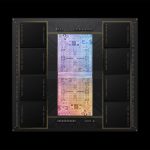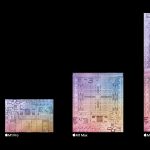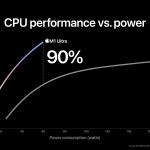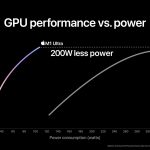As if the M1, M1 Pro and M1 Max weren't enough, Apple has now announced the M1 Ultra. Based on the same 5nm process node, the new M1 series chip consists of two interconnected M1 Max chips using UltraFusion packaging architecture, totalling 20x CPU cores and 64x GPU cores in a single SoC.
For now, the only device announced to feature the M1 Ultra is the new Mac Studio, but considering the performance promised by Apple, we expect to see more devices using this chip soon. The M1 Ultra consists of 114 billion transistors, (a record for consumer-oriented chips), that can be connected to a maximum of 128GB of RAM, offering up to 800GB/s of memory bandwidth. In addition, it also packs a 32-core Neural Engine, which allows video professionals to transcode video to ProRes up to 5.6x faster than with a 28-core (Intel Xeon) Mac Pro with Afterburner.
Thanks to Apple's UltraFusion technology, the Cupertino-based company created a chip with 20x CPU cores, from which 16x focus on performance while the remaining four focus on efficiency. The new Apple chip can provide 2.5TB/s of interprocessor bandwidth, enough to make it work, behave and be recognized by software as one chip.
According to Apple, the M1 Ultra can deliver up to 90% more multi-core performance than the Intel Core i5-12600K at the same power consumption. Furthermore, the new M1 chip reaches peak performance using 100 fewer watts.
Apple also compared its new chip with the RTX 3060 Ti, claiming the M1 Ultra offers similar GPU performance in 3D rendering and image processing workloads at a third of the power consumption. Additionally, as per Apple's test, the M1 Ultra GPU performs slightly above the RTX 3090 at the same 3D rendering and image processing workloads while consuming 200W less power.
Discuss on our Facebook page, HERE.
KitGuru says: The new M1 Ultra's efficiency looks to be a few steps above the competition. However, judging from what Apple shared during the announcement, it seems the Core i9-12900K will still be the performance king in the consumer market.
 KitGuru KitGuru.net – Tech News | Hardware News | Hardware Reviews | IOS | Mobile | Gaming | Graphics Cards
KitGuru KitGuru.net – Tech News | Hardware News | Hardware Reviews | IOS | Mobile | Gaming | Graphics Cards








